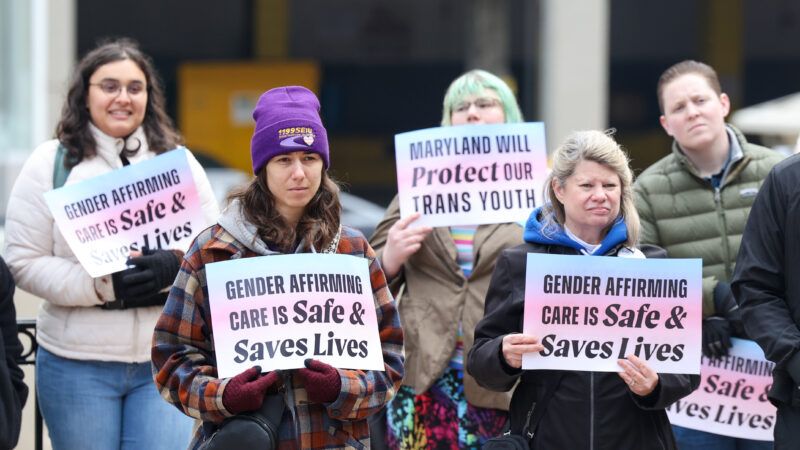SCOTUS Upholds Tennessee Law Banning Medical Transition for Transgender Kids
With the culture war blazing, not even the Supreme Court could agree on the medical facts of the case.

On Wednesday, the Supreme Court upheld a Tennessee law banning minors from accessing certain kinds of controversial gender-transition treatments. The lawsuit over the case hinged on whether the state's ban on hormones, puberty blockers, and surgical interventions violated the Equal Protection Clause and required a stricter standard of scrutiny than the one a previous appeals court used.
The court made its decision along ideological lines, with three liberal justices dissenting. In his majority opinion, Chief Justice John Roberts wrote that the law, Senate Bill 1, "does not exclude any individual from medical treatments on the basis of transgender status but rather removes one set of diagnoses—gender dysphoria, gender identity disorder, and gender incongruence—from the range of treatable conditions."
"If a transgender boy seeks testosterone to treat his gender dysphoria, SB1 prevents a healthcare provider from administering it to him," Roberts continued. "If you change his biological sex from female to male, SB1 would still not permit him the hormones he seeks because he would lack a qualifying diagnosis for the testosterone—such as a congenital defect, precocious puberty, disease, or physical injury."
Roberts' opinion also emphasized the ongoing medical controversy over youth gender medicine, noting that health authorities in other countries have scaled back or expressed skepticism over these treatments, leading to "open questions" about the safety of interventions like puberty blockers and hormones for minors.
"This case carries with it the weight of fierce scientific and policy debates about the safety, efficacy, and propriety of medical treatments in an evolving field. The voices in these debates raise sincere concerns; the implications for all are profound," Roberts wrote, concluding that "the Equal Protection Clause does not resolve these disagreements."
"Having concluded it does not, we leave questions regarding its policy to the people, their elected representatives, and the democratic process," he added.
In contrast, Justice Sonia Sotomayor's dissent painted an entirely different picture of the medical landscape. "When provided in appropriate cases, gender-affirming medical care can meaningfully improve the health and wellbeing of transgender adolescents, reducing anxiety, depression, suicidal ideation, and (for some patients) the need for more invasive surgical treatments later in life," adding that the law "plainly classifies on the basis of sex."
The justices' response to the facts presented in the case indicates just how much the culture war battle over childhood gender transition has affected the ability to create a scientific consensus around these treatments. Depending on who you ask, interventions like puberty blockers and hormones are either life-saving, medically backed interventions that improve the lives of thousands of struggling children, or pseudoscientific, experimental, reckless interventions in the healthy development of vulnerable kids. Whether or not these treatments are prudent, state intervention only seems likely to make reaching scientific consensus more difficult.
